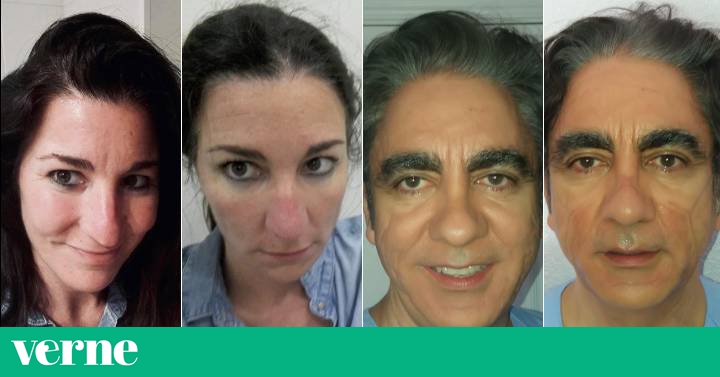Fernando González is a doctor and, although he continues to go to work every day, he has been isolated from his family for six weeks in the attic of his house. Ana Criado is a nurse and, although she has not abandoned her work routine, she eats each day at a table separate from her two children and her husband. The home could be the ideal refuge for hospital workers, who in Spain are bearing a higher rate of contagion by coronavirus than in any other country. But the fear of infecting loved ones has painfully disrupted home routines and prevents even the simplest displays of affection.
We have asked some hospital workers what they feel every time they leave their homes to go to the health centers and every time they return from them - those moments that, according to the warlike language with which many politicians are referring to the current health crisis, correspond to the time to go and return to the battlefront. Their responses convey helplessness over farewells and reunions devoid of hugs. To illustrate it, in addition, the protagonists of this article have shared with us images of their when they leave and when they return from their work. The growing furrows on their faces are an unappealable testimony to their daily sacrifice.
Leaving home
Fernando González (55 years old) is head of the Ophthalmology Service of the La Mancha-Centro Hospital (Alcázar de San Juan, Ciudad Real), but the overflow of hospitals during the health crisis has led him to become an internal medicine assistant in a "covid plant" from the same center. For almost six weeks, González has lived in isolation in the attic of his own house, where his wife and two university children also reside. The physical contact of this family has been completely eliminated, neither kisses nor hugs. "With this we have realized that affection can be transmitted in another way, now I love you without touching when you go to work makes more sense than before," reflects González.
Ana Criado (41 years old), Head of Nursing at the Igualada hospital, one of the centers hardest hit by the pandemic, cannot hug or kiss her seven and five-year-old children or her husband when he leaves for work, a farewell. cold, as the nurse says, "it is affecting me a lot". "I am a very loving person and in these hard times not being able to hug my family is finding it very difficult," says Criado, who eats even at another table in his house, separated from his family.
More than 35,000 health workers have tested positive for coronavirus to date in Spain, representing 20% of all affected. This data conditions the spirits of professionals who fear taking the virus back home and infecting their loved ones. Pedro Luis Moro (37 years old) is a caretaker at the Hospital Clinico Universitario de Valladolid and lives with his eight-month pregnant partner. "I can't help but walk out the door worried about what might happen," says Moro, "although I try not to be noticed when I say goodbye to her."
If the general population is aware of the hygiene and precautionary measures to be taken when going outside, the toilets are even more so. No one leaves home without a mask on. In the case of the doctor Rut del Valle (40 years), she avoids taking the elevator to go up and down the five floors that separate her house from the street. Although social networks have shown these days cases in which some neighbors repudiated health personnel and other employees of essential jobs with whom they share a building, the case of Del Valle shows another more generous reality. "Sometimes I come across a neighbor who knows what I do and they ask me how I am, how I am doing and they thank me for my work," says the healthcare professional at the Infanta Sofía hospital (San Sebastián de los Reyes, Madrid ) who walks daily to work. "The truth is that she is grateful and more living alone as is my case."
The nurse from the Gregorio Marañón hospital in Madrid Antonio Trigo (29 years old) also prefers to walk to work. "The two weeks of total confinement and with the streets empty was scary to walk alone," he says. "It also coincided with the worst hospital moments and I was a little overwhelmed and depressed. It was nice to walk and not have to stop to cross any street, but even so it generated a lot of concern. Now more people are seen on the street," adds Trigo. , who moved to a friend's house when the health crisis began to avoid infecting his elderly parents.
There are those who find in those empty streets the only quiet moment of the day, like Ana Criado. "In the hospital everything is a maelstrom, but I don't stop at home either because when I arrive, I have to take turns with my husband to take care of the children. It's weird, but I like that journey from home to work and from work to home "says the nurse.
Back home
"My heart breaks when my two-year-old grandchildren who are wanting to see me hear the door and come running to hug me, but I have to tell them no, give me a little time, that Grandma has to shower first, "says Carmen Vázquez (47 years old), cleaning staff at the Hospital Clinico Universitario de Valladolid who also lives with her two daughters and her husband.
Health personnel reproduce in their homes the same protocols that are carried out in hospitals: dirty area (where there may be contaminated materials) and clean area (in which it is ensured that everything is disinfected). Everyone practically undresses at the entrances to their homes and runs to the shower before greeting their family. "The time at home I use to put washing machines, make food and play with my grandchildren because my daughter is overwhelmed, it is not easy to entertain two such small children," adds Vázquez.
As recommended by the Spanish Psychiatric Society in this guide for healthcare personnel, it is important to rest, try to plan a routine outside of work that involves physical exercise, reading or entertainment habits and to be in contact with family and loved ones. "It is essential for me to speak to my parents on the phone every day, they were the ones who worried me the most at first because they are older and I did not know if I could have infected them the days before everything exploded," says Rut Del Valle, who suffers insomnia caused by the stress to which it is subjected these days. "I have had to resort to medication to be able to rest. I also try to do sports, meditate, cook ...", he adds.
Other recommendations of the psychiatric institution is to limit exposure to the media. "Before, I used to watch the news three times a day and for a few weeks now I only see it in the morning, due to the figures being updated especially because I started to notice that it was affecting me mentally," says Antonio Trigo, who values "more than never the few days off that I have. " "I try to catch up with friends by video call because normally my schedules don't match."
But a complete disconnection is not always possible when you get home, as happens with Fernando González and Ana Criado, who have a team of workers under their charge and many steps to take after their workday. "I really would love to be able to sit quietly and read a book at home, but I don't have time to do it," says Criado, notably affected on the other end of the phone.
A few days ago, Fernando González's family managed to see a movie together for the first time. "Each one in a place in the room; until now I had only sat with my wife on the sofa. Of course, she on one end and I on the other," says the eye doctor.
There is only one month left until Pedro Luis Moro's baby is born, so he takes advantage of the time he is at home with his partner to "leave everything ready". "The fact that it is on the way and that makes us think about the future, makes me more optimistic and face this day to day that we have had to live differently," concludes Moro.
* You can also follow us on Instagram and Flipboard. Don't miss the best of Verne!





